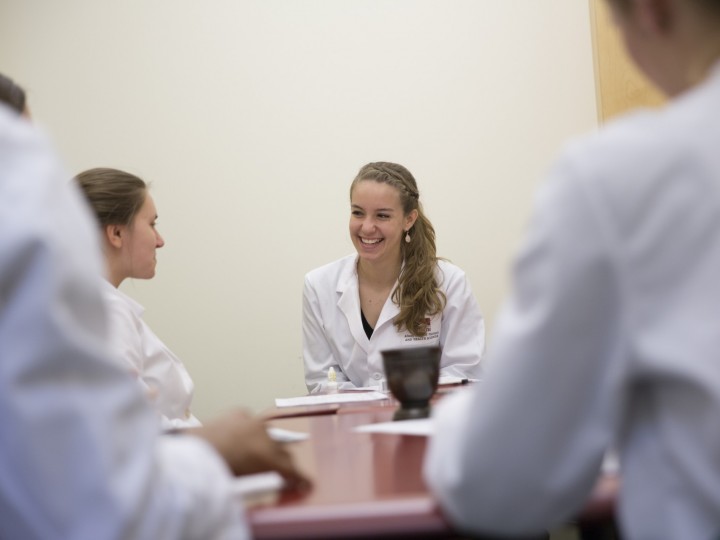
Pharmaceutical Sciences Master’s Degree Overview
Get a personalized and comprehensive academic experience that prepares you to immediately work to impact lives as a pharmaceutical scientist or pursue a Ph.D.
In the pharmaceutical sciences master’s program at ACPHS, you’ll learn the foundations of pharmaceutical sciences, drug design and development, drug synthesis, cancer genetics and all the core sciences critical to becoming a pharmaceutical expert.
Every student gets paired with a faculty researcher, ensuring that your experience will include the dedicated mentorship of an expert researcher devoted to your success. Faculty research-mentors stay paired with students for the duration of the two-year pharmaceutical science master’s program, working in our industry-standard laboratory facilities.
Students are trained in various research techniques and instrumentation that are crucial for a career in the pharmaceutical industry. Importantly, students gain scientific writing and critical thinking skills in this program, and most often end up publishing their research in a reputed peer-reviewed journal as early as the end of their second year.
The pharmaceutical sciences master’s degree at ACPHS gives you the option to complete a thesis-based research project or a non-thesis capstone project. The thesis-based research option is an opportunity for research-focused students to work side-by-side with faculty on a topic of their choosing. The non-thesis capstone is designed for students interested in advancing their pharmaceutical sciences careers without an intense focus on a specific topic of research.
In the pharmaceutical sciences master’s program at ACPHS, you’ll learn the foundations of pharmaceutical sciences, drug design and development, drug synthesis, cancer genetics and all the core sciences critical to becoming a pharmaceutical expert.
Every student gets paired with a faculty researcher, ensuring that your experience will include the dedicated mentorship of an expert researcher devoted to your success. Faculty research-mentors stay paired with students for the duration of the two-year pharmaceutical science master’s program, working in our industry-standard laboratory facilities.
Students are trained in various research techniques and instrumentation that are crucial for a career in the pharmaceutical industry. Importantly, students gain scientific writing and critical thinking skills in this program, and most often end up publishing their research in a reputed peer-reviewed journal as early as the end of their second year.
The pharmaceutical sciences master’s degree at ACPHS gives you the option to complete a thesis-based research project or a non-thesis capstone project. The thesis-based research option is an opportunity for research-focused students to work side-by-side with faculty on a topic of their choosing. The non-thesis capstone is designed for students interested in advancing their pharmaceutical sciences careers without an intense focus on a specific topic of research.
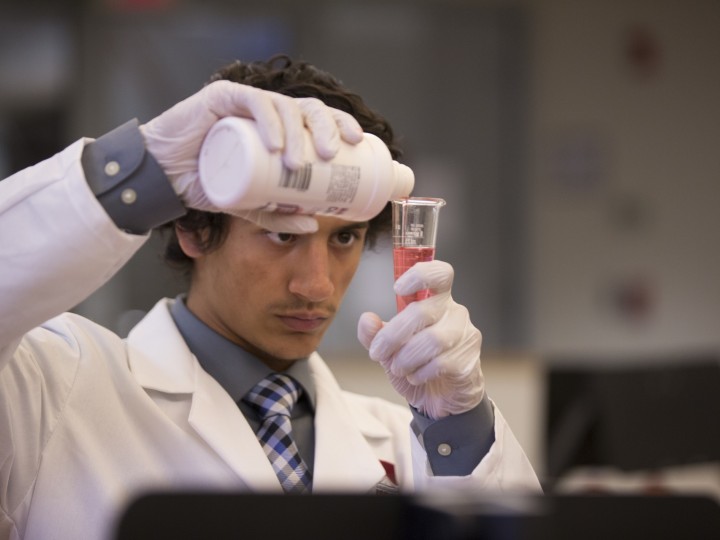
Why Earn Your Master’s in Pharmaceutical Sciences?
Developing a new drug and bringing it to market can take years.
Whether you work in a lab or an office, if you want to be successful in this industry, it is essential to have a thorough understanding of the scientific techniques and disciplines required for discovery, development and evaluation of pharmaceuticals.
For those seeking careers in the biomedical and pharmaceutical industries, earning a master’s in pharmaceutical sciences provides the depth of knowledge and research experience necessary to advance in the field — taking a deeper dive into areas including pharmacology, medicinal chemistry, pharmaceutics, toxicology, pharmacokinetics, cancer research and drug metabolism.
The pharmaceutical sciences master’s program at ACPHS provides a curriculum tailored to meet the needs of future research scientists, pharmacists, and working professionals hoping to make a difference in the world through scientific discovery.
Whether you work in a lab or an office, if you want to be successful in this industry, it is essential to have a thorough understanding of the scientific techniques and disciplines required for discovery, development and evaluation of pharmaceuticals.
For those seeking careers in the biomedical and pharmaceutical industries, earning a master’s in pharmaceutical sciences provides the depth of knowledge and research experience necessary to advance in the field — taking a deeper dive into areas including pharmacology, medicinal chemistry, pharmaceutics, toxicology, pharmacokinetics, cancer research and drug metabolism.
The pharmaceutical sciences master’s program at ACPHS provides a curriculum tailored to meet the needs of future research scientists, pharmacists, and working professionals hoping to make a difference in the world through scientific discovery.
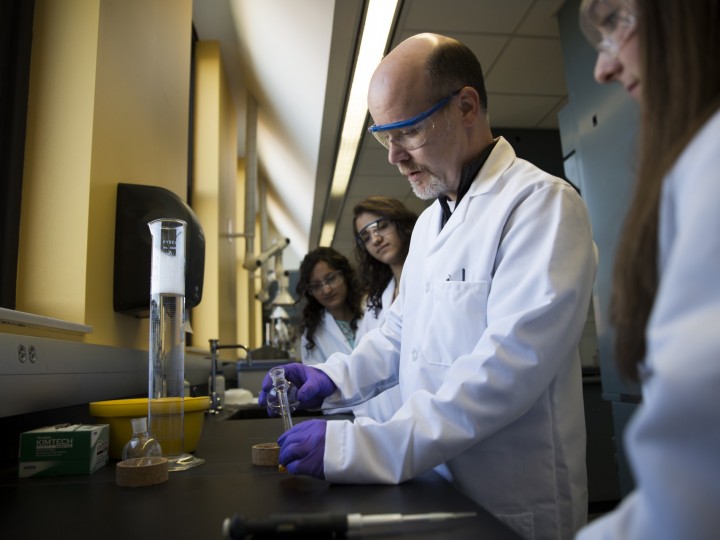
Research in the Pharmaceutical Sciences Master’s Program
Hands-on research is conducted alongside your faculty-mentor in ACPHS laboratories that match industry standards, meaning you'll get to train with the same equipment and techniques required of professional pharmaceutical scientists’ post-graduation.
If you’re more interested in jobs than research, you can capitalize on Albany's proximity to many major pharma companies, including Regeneron and Curia, to access internships and industry jobs. Many graduates have gone on to intern or begin careers at Pfizer, Mega LifeSciences, Bristol Myers Squibb, Beech-Nut Nutrition, National Renewable Energy Lab, Truven Health Analysis and others.
If you’re more interested in jobs than research, you can capitalize on Albany's proximity to many major pharma companies, including Regeneron and Curia, to access internships and industry jobs. Many graduates have gone on to intern or begin careers at Pfizer, Mega LifeSciences, Bristol Myers Squibb, Beech-Nut Nutrition, National Renewable Energy Lab, Truven Health Analysis and others.
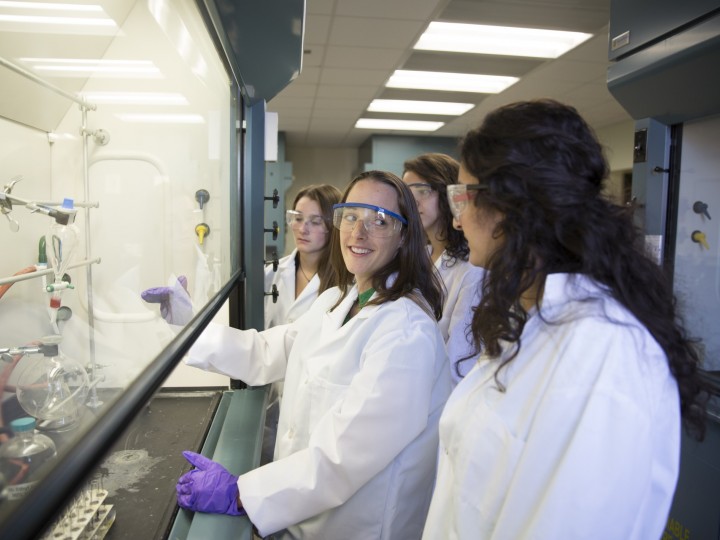
Pharmaceutical Sciences Jobs
A master’s in pharmaceutical sciences gets you one step closer to creating new drugs in a research laboratory or entering a Ph.D. program.
ACPHS graduates with their MS Pharmaceutical Sciences have pursued doctorates at prestigious graduate programs such as Auburn University, Rutgers University, the University of Iowa, Tufts University, University of Rochester, University of Toledo, University of Maryland, University of Nebraska, Weill-Cornell and SUNY Stony Brook.
You can also take your pharmaceutical sciences master’s degree and enter directly into a new career developing new life-changing medicines. A large majority of MSPS graduates join the pharmaceutical industry as soon as they graduate. Often they have jobs lined up before they even graduate.
Whether you want to jump directly into an impactful career or set yourself up for your next academic adventure, a master's in pharmaceutical sciences from ACPHS will give you the personalized attention, hands-on experiences and scientific foundation to succeed.
ACPHS graduates with their MS Pharmaceutical Sciences have pursued doctorates at prestigious graduate programs such as Auburn University, Rutgers University, the University of Iowa, Tufts University, University of Rochester, University of Toledo, University of Maryland, University of Nebraska, Weill-Cornell and SUNY Stony Brook.
You can also take your pharmaceutical sciences master’s degree and enter directly into a new career developing new life-changing medicines. A large majority of MSPS graduates join the pharmaceutical industry as soon as they graduate. Often they have jobs lined up before they even graduate.
Whether you want to jump directly into an impactful career or set yourself up for your next academic adventure, a master's in pharmaceutical sciences from ACPHS will give you the personalized attention, hands-on experiences and scientific foundation to succeed.
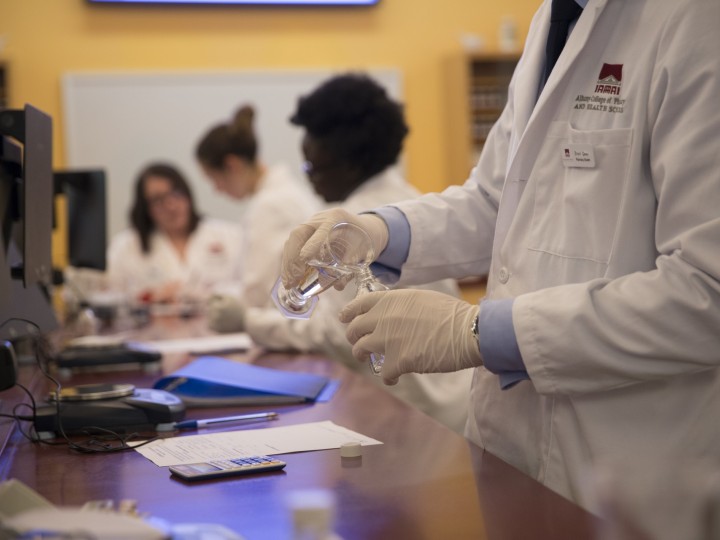
Pharmaceutical Sciences Master’s Degree Coursework
The curriculum of ACPHS two-year Master of Science in Pharmaceutical Sciences program combines laboratory experiences and courses that build a strong foundation in all the sciences essential to research and drug development.
You can also apply and obtain teaching assistantship or research assistantship during your master’s education, earning around $2,500-$3,000 per semester.
The program culminates with a thesis (research project of your choice) or a capstone project that allows you to personalize your education while showcasing your knowledge for future employers. Recently, students have landed internships as well as jobs at Eli Lilly and Regeneron.
You can also apply and obtain teaching assistantship or research assistantship during your master’s education, earning around $2,500-$3,000 per semester.
The program culminates with a thesis (research project of your choice) or a capstone project that allows you to personalize your education while showcasing your knowledge for future employers. Recently, students have landed internships as well as jobs at Eli Lilly and Regeneron.
Contact the Program Director
Manish Shah, Ph.D.
Associate Professor
Manish.Shah@acphs.edu
518-694-7343
Associate Professor
Manish.Shah@acphs.edu
518-694-7343
Contact the Graduate Admissions Office
106 New Scotland Ave.
Albany, NY 12208
admissions@acphs.edu
518-694-7221
Albany, NY 12208
admissions@acphs.edu
518-694-7221

